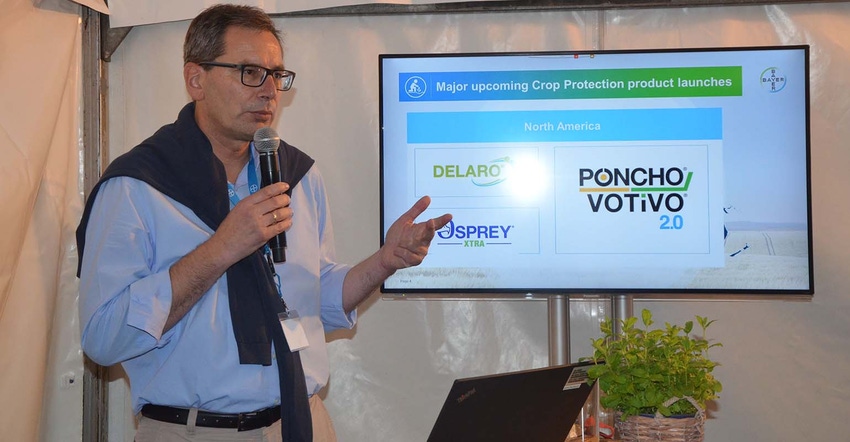
This fall at its Future of Farming Dialogue in Monheim, Germany, Bayer Crop Science announced it is investing around €5 billion into its R&D pipeline over from 2015 to 2020, and is committed to bringing 15 active ingredients and traits or trait combinations to the market between 2017 and 2020.
Here's a look at some of the latest chemistries and biological products in the pipeline coming to the U.S.
Poncho/Votivo 2.0 adds a new component to Poncho/Votivo, a seed treatment available in corn, soybeans, sorghum and cotton.
"This component consists out of a new Bacillus strain of bacteria which provides a stabilized enzyme in the soil around the root," said Arndt Wellmann, head of agronomic development within Bayer Crop Science’s R&D organization.
That stabilized enzyme helps provide sugars for native microbes in the soil to increase microbial activity, and improve nutrient availability.
Trials with Poncho/Votivo 2.0 conducted by Bayer over the last three years have shown an average 4 bushel per acre yield increase over corn seed treated with Poncho/Votivo – while keeping the same root protection as Poncho/Votivo.
The Poncho/Votivo seed treatment uses a unique bacteria strain that creates a barrier to protect roots from nematodes. It also uses a systemic agent that's absorbed by new roots to control early-season insect pests.
Osprey Xtra, a new premix herbicide and a new generation of Osprey from Bayer, will soon be registered for control of grassy weeds in wheat in the U.S. "We wanted to further increase the efficacy of grass control. We did this by adding another active ingredient which is called thiencarbazone-methyl," said Wellmann.
This includes control of grassy weeds like rattail fescue, noted Wellmann. Osprey Xtra, an ALS-inhibitor, can be used as a post-emergence application for effective rattail fescue control. While certain ALS herbicides can impact rotational crops planted the following year, Wellmann says Osprey provides flexibility with rotation crops, and can also be tank mixed with broadleaf herbicides. "I think it's an ideal situation for the Pacific Northwest area for the wheat growers there," he said.
Tetraniliprole is a new diamide insecticide for control of lepidopteran pests, or caterpillars, as well as certain sucking pests and beetles in a range of crops like rice, corn and fruits and vegetables.
According to Bayer, it will first be launched into the market in 2019, likely starting with New Zealand, but will be coming to the U.S. market soon after.
"It is setting the new standard for the diamide segment for foliar applications, but can also be used in drench or drip applications and as a seed treatment in particular against wire worms in cereals," said Wellman. "In corn it controls spodoptera frugiperda [fall armyworm], and offers better control of these pests compared to Belt [flubendiamide], but also controls European corn borer."
Delaro, recently announced at the 2017 Farm Progress Show, is a fungicide intended to provide broad-spectrum protection using two modes of action with strobilurin and triazole-based active ingredients.
One of the downfalls of strobilurin-based fungicides is the development of resistance among certain fungal diseases. According to Bayer, Delaro is intended to provide a curative effect to control diseases already present as well as a residual effect for long-lasting control, while preventing resistance from developing.
"They are prone to resistance development, and this is perfectly addressed by this product," said Wellmann.
About the Author(s)
You May Also Like






